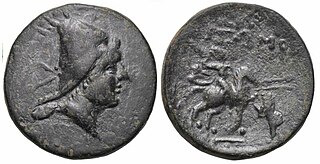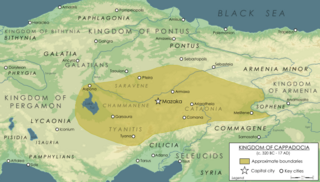Related Research Articles

The 5th century BC started the first day of 500 BC and ended the last day of 401 BC.
The 6th century BC started on the first day of 600 BC and ended on the last day of 501 BC.

The 1st millennium BC, also known as the last millennium BC, was the period of time lasting from the years 1000 BC to 1 BC. It encompasses the Iron Age in the Old World and sees the transition from the Ancient Near East to classical antiquity.
This article concerns the period 479 BC – 470 BC.
Year 425 BC was a year of the pre-Julian Roman calendar. At the time, it was known as the Year of the Tribunate of Atratinus, Medullinus, Cincinnatus and Barbatus. The denomination 425 BC for this year has been used since the early medieval period, when the Anno Domini calendar era became the prevalent method in Europe for naming years.
Year 380 BC was a year of the pre-Julian Roman calendar. At the time, it was known as the Year of the Tribunate of Poplicola, Poplicola, Maluginensis, Lanatus, Peticus, Mamercinus, Fidenas, Crassus and Mugillanus. The denomination 380 BC for this year has been used since the early medieval period, when the Anno Domini calendar era became the prevalent method in Europe for naming years.

The year 600 BC was a year of the pre-Julian Roman calendar. In the Roman Empire, it was known as year 154 Ab urbe condita. The denomination 600 BC for this year has been used since the early medieval period, when the Anno Domini calendar era became the prevalent method in Europe for naming years.
The year 524 BC was a year of the pre-Julian Roman calendar. In the Roman Empire, it was known as year 230 Ab urbe condita. The denomination 524 BC for this year has been used since the early medieval period, when the Anno Domini calendar era became the prevalent method in Europe for naming years.
The year 530 BC was a year of the pre-Julian Roman calendar. In the Roman Empire, it was known as year 224 Ab urbe condita. The denomination 530 BC for this year has been used since the early medieval period, when the Anno Domini calendar era became the prevalent method in Europe for naming years.
The year 570 BC was a year of the pre-Julian Roman calendar. In the Roman Empire, it was known as year 184 Ab urbe condita. The denomination 570 BC for this year has been used since the early medieval period, when the Anno Domini calendar era became the prevalent method in Europe for naming years.
The year 580 BC was a year of the pre-Julian Roman calendar. In the Roman Empire, it was known as year 174 Ab urbe condita. The denomination 580 BC for this year has been used since the early medieval period, when the Anno Domini calendar era became the prevalent method in Europe for naming years.

Arsames I seems to have taken control of Commagene, Sophene and Armenia in the year 260 BC after the death of his grandfather Orontes III, king of Armenia, and his father Sames, king of Commagene.

The Achaemenid Empire issued coins from 520 BC–450 BC to 330 BC. The Persian daric was the first gold coin which, along with a similar silver coin, the siglos represented the first bimetallic monetary standard. It seems that before the Persians issued their own coinage, a continuation of Lydian coinage under Persian rule is likely. Achaemenid coinage includes the official imperial issues, as well as coins issued by the Achaemenid provincial governors (satraps), such as those stationed in Asia Minor.

The history of ancient Lebanon traces the course of events related to the geographic area in the Eastern Mediterranean of what is now known as Lebanon from the beginning of antiquity to the beginning of Arab rule.

The Ptolemaic Kingdom or Ptolemaic Empire was an Ancient Greek polity based in Egypt during the Hellenistic period. It was founded in 305 BC by the Macedonian general Ptolemy I Soter, a companion of Alexander the Great, and ruled by the Ptolemaic dynasty until the death of Cleopatra VII in 30 BC. Reigning for nearly three centuries, the Ptolemies were the longest and final dynasty of ancient Egypt, heralding a distinctly new era for religious and cultural syncretism between Greek and Egyptian culture.
This timeline of ancient history lists historical events of the documented ancient past from the beginning of recorded history until the Early Middle Ages. Prior to this time period, prehistory civilizations were pre-literate and did not have written language.

The Twenty-seventh Dynasty of Egypt, also known as the First Egyptian Satrapy, was a province (Satrapy) of the Achaemenid Persian Empire between 525 BC and 404 BC. It was founded by Cambyses II, the King of Persia, after the Battle of Pelusium and the Achaemenid conquest of Egypt, and his subsequent crowning as Pharaoh of Egypt. It was disestablished upon the rebellion and crowning of Amyrtaeus as Pharaoh. A second period of Achaemenid rule in Egypt occurred under the Thirty-first Dynasty of Egypt.

The Achaemenid Empire or Achaemenian Empire, also known as the First Persian Empire, was an ancient Iranian empire founded by Cyrus the Great of the Achaemenid dynasty in 550 BC. Based in modern-day Iran, it was the largest empire by that point in history, spanning a total of 5.5 million square kilometres. The empire spanned from the Balkans and Egypt in the west, West Asia as the base, the majority of Central Asia to the northeast, and the Indus Valley to the southeast.

Cappadocia was a Hellenistic-era Iranian kingdom centered in the historical region of Cappadocia in Asia Minor. It developed from the former Achaemenid satrapy of Cappadocia, and it was founded by its last satrap, Ariarathes. Throughout its history, it was ruled by three families in succession; the House of Ariarathes (331–96 BC), the House of Ariobarzanes (96–36 BC), and lastly that of Archelaus (36 BC–17 AD). In 17 AD, following the death of Archelaus, during the reign of Roman emperor Tiberius (14–37 AD), the kingdom was incorporated as a Roman province.